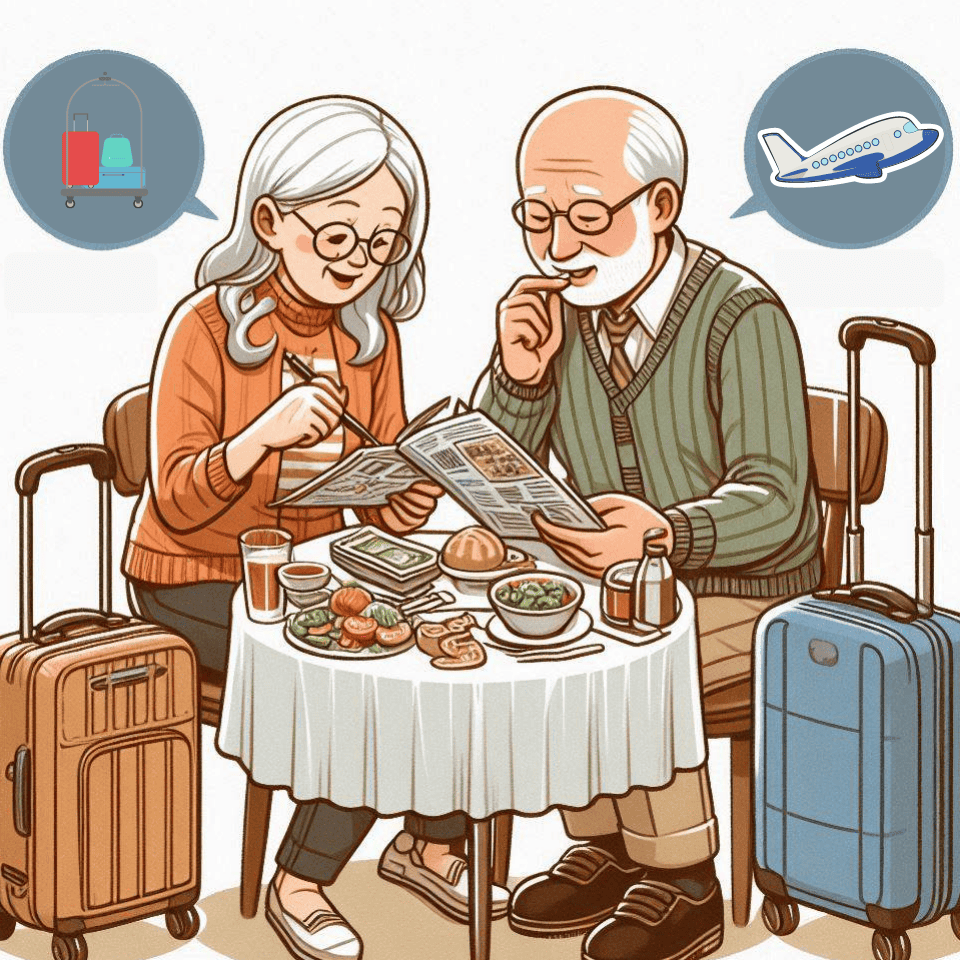
Are you a senior traveler hungry for adventure but want to keep an eye on your budget? Traveling should be a joyful and enriching experience. And to many folks, retirement is the perfect time to explore the world. The good news is, it doesn’t have to break the bank.
This guide focuses on helping you find comfortable, accessible, and budget-friendly travel options that cater specifically to your needs. Remember, age is just a number, and with the right planning, you can visit stunning locales without stressing over finances. We will also look at how you can maximize your travel experiences while managing your budget effectively. Let’s gear up for affordable travels that promise comfort and adventure! 🛫
Understanding Budget Travel for Seniors
What Does Budget Travel Mean for Seniors?
Budget travel for seniors isn’t just about finding the cheapest options—it’s about making value-for-money choices that enhance travel comfort and accessibility. When we talk about budget travel here, we focus on maximizing experiences while minimizing expenses without compromising your comfort.
This includes seeking out destinations that are not only cost-effective but also senior-friendly, offering easy access, good healthcare, and conveniences that allow for a relaxing and enjoyable experience.
Benefits of Budget Travel in Retirement
One of the highlights of retirement is the newfound freedom to explore the world at leisure. Engaging in travel as a senior not only opens up new horizons but also offers enriching cultural experiences. Moreover, staying active through travel can improve your physical and mental health.
Budget travel, specifically, allows you to extend the number and length of your trips. Instead of a single luxury tour, your budget could afford several trips to diverse destinations, multiplying the joys of discovery and adventure.
Making the Most of Your Travel Budget
Stretching your travel dollars requires smart planning and a few insider tips:
- Early Planning: Booking your journey months in advance can lock in better rates on flights and accommodations.
- Travel During Off-Peak Periods: Costs typically plummet during the offseason. Less crowded attractions also mean a more relaxed and enjoyable experience for you.
- Join Loyalty Programs: Participating in loyalty programs from airlines, hotels, and other travel-related services can offer significant savings through points or miles that can be redeemed for travel or other rewards.
Additional Information: Popular Destinations for Senior Travelers
To give you a better sense of where your fellow senior travelers are enjoying their adventures, here’s a quick look at some popular yet budget-friendly destinations:
| Destination | Why it’s Great for Seniors | (Estimated) Average Cost per Day (USD) |
|---|---|---|
| Algarve, Portugal | Gentle climate, accessible beaches, affordable healthcare | 50-70 |
| Chiang Mai, Thailand | Low cost of living, rich culture, friendly locals | 30-50 |
| Sedona, Arizona, USA | Stunning natural beauty, wellness retreats | 80-100 |
These destinations not only cater to seniors in terms of accessibility and facilities but also provide a rich cultural experience at a fraction of the cost of more mainstream tourist spots, ensuring your travels are both enjoyable and economical.
Planning Your Trip
Choosing the Right Destination
Selecting the ideal place to visit involves more than just finding a beautiful location; it’s about ensuring the destination meets all your senior-specific needs. Start by identifying places known for their senior accessibility, safety, and healthcare facilities—essential factors that guarantee peace of mind during your travels. Researching online forums and travel sites specifically catered to senior travelers can provide invaluable insights and recommendations.
It’s also beneficial to consider the climate and terrain of potential destinations. Some seniors may prefer warmer, stable climates and flat landscapes which are easier to navigate. Destinations with a strong infrastructure for tourism generally offer more in terms of quality services, medical facilities, and accessibility, making them ideal choices for senior travelers.
Lastly, think about what type of activities you wish to engage in. Whether it’s cultural explorations, nature hikes, or beach relaxation, ensure the location supports your interests with appropriate and accessible options. This step not only enhances the enjoyment but also ensures that you can fully engage with the destination at your own comfort level.
Best Times to Travel
Timing your trip can significantly affect both the cost and the experience of your travel. Traveling during the off-peak season can save you up to 30-50% on accommodations and flights. Fewer tourists also mean a quieter environment to enjoy the sights and more personalized attention from tour guides and locals.
Consider the weather patterns of your chosen destination and aim for a shoulder season—periods between peak and off-peak seasons. These times offer a good balance of mild weather and reduced prices. Additionally, some destinations might feature special events or festivals during these times, providing a unique cultural experience without the high season crowds.
For seniors, avoiding extreme weather conditions such as excessive heat, humidity, or icy climates is crucial. This consideration not only impacts your comfort but also ensures your safety, making your travel experiences more enjoyable and stress-free.
Travel Insurance and Health Safety Tips
When it comes to traveling at an older age, securing comprehensive travel insurance is non-negotiable. Look for policies that cover pre-existing conditions, medical emergencies, and potential cancellations. This ensures that you are covered for virtually any unexpected situations that might occur while away from home.
It’s also important to familiarize yourself with the healthcare services available at your destination before you depart. Knowing the location of the nearest hospital, pharmacy, and English-speaking doctors can ease any potential stressful situations during your travels.
Lastly, maintain a routine health check and carry a sufficient supply of any prescribed medications. Packing a basic travel health kit equipped with treatments for minor ailments is also advisable. Staying healthy not only allows you to enjoy your trip to the fullest but also prevents minor issues from escalating into major emergencies.
Staying Informed: What You Need to Know Before You Go
Referencing a quick checklist before your travels can ensure you’ve covered all the bases.
Here’s a simplified guide for your convenience:
| Checklist Item | Description |
|---|---|
| Document Check | Passport validity, visas, insurance paperwork, medical prescriptions |
| Health Preparations | Vaccinations, health check-ups, travel health kit |
| Local Research | Accessibility options, nearby medical facilities, local transportation |
| Budget Planning | Estimated daily costs, pre-booked tickets and accommodations |
Using this table as a guide, you can streamline your planning process and focus on enjoying a hassle-free trip tailored to your needs and interests.
Budget-Friendly Transportation Options
Cost-Effective Booking Strategies

When planning your trip, how and when you book your transportation can significantly impact your budget. To secure the best prices on plane tickets, consider booking several months in advance or be on the lookout for last-minute deals. Airlines often offer lower prices for weekday travel and during less popular flight times.
Using comparison websites is a smart move, as they allow you to view all available options and choose the one that provides the best value for money. Additionally, setting up fare alerts can keep you informed when prices drop to your desired destination, ensuring you never miss an opportunity to save.
Consider alternative airports as well. Flying into or out of smaller, regional airports can sometimes be cheaper than using major airports, and they often provide a more relaxed travel experience with shorter lines and less crowded facilities.
Senior Discounts and Perks
Many transportation providers offer discounts specifically for senior travelers. Airlines, train companies, and bus services often provide a percentage off for travelers over a certain age. It’s essential to inquire about these discounts when booking your tickets, as they can substantially reduce your travel costs.
For those traveling in the U.S., the Amtrak Senior Discount offers 10% off on most rail fares for travelers aged 65 and older. Similarly, many bus companies across Europe offer senior rates for bus tickets. Don’t forget to carry your ID or any other required document to prove your eligibility for these discounts.
Some cities also offer special travel cards for seniors, which can be used on public transport and provide reduced fares or even free travel within the city. These cards can be incredibly advantageous for exploring major cities where catching a bus or a subway is part of the daily experience.
Alternative Transportation Means
Beyond conventional air travel, trains, and buses, there are other cost-effective ways to reach your destination. Car rentals, while generally more expensive, can be shared with fellow travelers, reducing the cost per person and offering the freedom to explore at your own pace.
Ferries can also offer a scenic and economical alternative, especially in regions like Scandinavia, the Mediterranean, and Southeast Asia, where waterways are a common part of the transportation network. For longer stays, consider leasing a vehicle, which can be cost-effective for periods of a month or longer and provides greater flexibility in travel plans.
Additionally, ridesharing apps like Uber and Lyft often operate at a lower cost than traditional taxis and are available in many countries around the world. They offer convenience and safety, allowing you to request a ride directly from your smartphone.
Example Fare Reductions for Seniors
To give you a clearer picture of how much you can save, here’s an example table of transportation discounts available for seniors in various locations:
| Mode of Transport | Location | Discount Offered | Requirement |
|---|---|---|---|
| Amtrak Train | USA | 10% off | Age 65+ |
| Public Bus | London, UK | Free Travel | Freedom Pass |
| BC Ferries | British Columbia, Canada | Discounted fares | Age 65+ with ID |
These discounts can make a significant difference in your overall travel budget, allowing you more financial freedom to explore and enjoy your destinations.
Accommodations for Seniors
Choosing Budget-Friendly Hotels
When picking accommodations, seniors should prioritize comfort, accessibility, and value for money. Look for hotels that offer senior discounts, which can significantly reduce the cost of your stay. Hotels often provide these discounts directly, or they may be available through various senior organizations or travel discount programs.
It’s important to consider the location of the hotel. Staying in a central area might be slightly more expensive, but it can save on transportation costs and time. Conversely, accommodations located further from the center are usually cheaper and might offer a quieter environment, which could be a priority for some travelers.
Moreover, check the amenities provided by the hotel. Essential features like elevators, grab bars in the bathrooms, and minimal thresholds can make a significant difference in comfort and accessibility. Some hotels also offer rooms specifically designed for seniors, featuring emergency buttons or special bath facilities.
Alternative Lodging Options
Hotels are not the only option for budget-conscious senior travelers. Short-term rental platforms like Airbnb or Vrbo can offer comfortable and often cheaper alternatives to traditional hotels. These rentals can also provide more space and amenities, such such as kitchens and laundry facilities, which are particularly beneficial for longer stays.
Another growing trend is home swapping, where you exchange homes with someone else for a period. This can provide all the comforts of home and significant savings. There are websites dedicated to helping seniors find exchange partners, such as Home Exchange, which has a filter for senior-friendly homes.
Hostels are no longer just for the young backpacker crowd; many have adapted to cater to travelers of all ages, offering private rooms and more relaxed environments. Some hostels are specifically targeting mature travelers who are looking for affordable and social lodging options.
Staying Connected Through Budget Apps
Technology can significantly enhance the experience of choosing and managing travel accommodations. Many apps and websites not only allow you to book on the go but also to score last-minute deals. Apps like HotelTonight specialize in such deals and can be perfect for spontaneous travelers.
Loyalty programs offered by hotel chains and booking websites can also lead to significant savings. By consistently booking with the same company, you accumulate points that can be redeemed for free nights, room upgrades, and other perks.
Moreover, using apps for reviews like TripAdvisor can assist in making informed decisions by reading about the experiences of other senior travelers. It’s always a good idea to know the pros and cons of each accommodation option from people who have similar needs and expectations.
Quick Comparison: Accommodation Options for Seniors
To help you visualize the differences in accommodation options, here’s a comparison table that might guide your next booking:
| Accommodation Type | Cost Efficiency | Amenities | Suitability for Longer Stays |
|---|---|---|---|
| Budget Hotels | Medium | Basic | Short Stays |
| Vacation Rentals | High | Full Set (kitchen, laundry) | Longer Stays |
| Home Swaps | High | Varies | Longer Stays |
| Senior-Friendly Hostels | Low | Basic to Medium | Short to Medium Stays |
Choosing the right type of accommodation is crucial for ensuring a comfortable, enjoyable, and budget-friendly trip. With the various options available, seniors can pick the perfect spot that balances cost, comfort, and convenience.
Eating and Dining on a Budget

Finding Affordable Dining Options
When traveling, discovering affordable places to eat that cater to your taste and dietary needs is crucial. Start by researching local eateries that offer senior discounts or special promotions. Many restaurants provide early-bird specials or set menus which are excellent for enjoying a high-quality meal at a lower price.
Consider the location of where you choose to dine. Restaurants situated in tourist-heavy areas typically charge more. Venturing slightly off the beaten path can lead to discovering local favorites that offer a more authentic and less expensive dining experience. Engaging with locals or other travelers can also provide personal recommendations that might not appear in guidebooks.
Additionally, always look for places that are accustomed to serving seniors, which may offer not only discounts but also healthier meal choices, smaller portion sizes, and a comfortable dining environment. These considerations can greatly enhance your dining experience, combining the pleasure of trying new foods with the practicality of sticking to your budget.
Preparing Meals and Snacks
If your accommodation includes a kitchen, consider preparing some of your meals. This can be a substantial budget saver, especially on longer trips. Local markets provide fresh ingredients and a chance to interact with local vendors, enriching your cultural experience while also keeping food costs low.
Packing snacks or making a picnic can be a delightful way to enjoy local parks or scenic areas without the expense of dining out. This is particularly effective in expensive countries where even fast-food prices may be steep. Bring along durable, easy-to-carry foods like nuts, fresh fruits, granola bars, or sandwiches that can sustain you throughout the day.
For even greater convenience and budget management, look for grocery stores offering in-store specials or discounts. Some store loyalty programs can also yield savings, even if you’re only in the area for a short time. Opting for generic brands rather than international ones can further help in reducing your grocery bill.
Leveraging Local Food Apps and Resources
Technological resources can assist you significantly in finding and enjoying meals on a budget. Food apps like Yelp and Google Maps provide reviews and price ranges, helping you decide where to eat based on current user feedback. These platforms often include menus, opening hours, and even directions, making it easier for you to plan according to your day’s itinerary.
Local food blogs and websites can offer a wealth of information on where to find the best deals around the city. They often highlight lesser-known dining spots frequented by locals, thereby offering authentic experiences at a lower cost.
Consider also using meal-prep and delivery services, which many cities offer. These platforms often have introductory deals or special rates for regular users, which can be convenient, especially if staying in without meal-prepped options.
Quick Dining Tips for Budget-Conscious Seniors
To summarize key strategies for enjoyable, affordable dining experiences, here’s a table that might be useful during your travels:
| Dining Tips | Description |
|---|---|
| Seek Local Eateries | Avoid tourist spots; look for where locals eat for authentic, less pricey meals. |
| Use Food Apps | Leverage apps for restaurant reviews, specials, and discounts. |
| Prepare Your Own Meals | Utilize kitchen facilities to make your own meals for substantial savings. |
By combining these strategies, you can explore the culinary delights of your destination without stretching your budget, ensuring a fulfilling and flavorsome travel experience.
Activities and Entertainment
Free and Low-Cost Attractions
Exploring doesn’t always have to come with a high price tag. Many cities offer a variety of free or low-cost attractions that are both enjoyable and culturally enriching. Museums, for instance, often have days when entry is free or discounted; it’s a perfect opportunity to immerse yourself in the local history and art without spending a dime.
Public parks, historic sites, and national monuments typically do not charge entry fees and are great places to spend a day exploring at your own pace. Additionally, many local municipalities host seasonal festivals or markets that are free to attend, giving you a taste of local traditions and craftsmanship.
Always check local tourism websites or visitor centers for a calendar of events during your stay. These can be invaluable resources for planning your days around free or affordable activities and ensuring you don’t miss out on great local experiences.
Leisure Activities Tailored for Seniors
Many destinations offer activity options that are particularly well-suited to seniors. Guided walking tours can provide insightful explorations of the area at a comfortable pace. These often focus on less physically demanding routes and include plenty of breaks, making them a fantastic and leisurely way to learn about your surroundings.
Gardens, art galleries, and theater matinees tend to offer a more relaxed and contemplative experience, often with discounts available for seniors. These venues not only cater to more tranquil tastes but also frequently feature accessibility accommodations, ensuring everyone can enjoy their offerings.
Workshops or classes designed for seniors, such as cooking classes, dance workshops, or photography classes, can also be enriching experiences that introduce you to new hobbies while allowing you to engage with fellow travelers and locals. These activities not only fill your travel itinerary with unique experiences but also provide valuable learning opportunities.
Using Technology to Find Activities
Leveraging technology can enhance your ability to discover and enjoy various activities efficiently. Apps and websites such as TripAdvisor, Eventbrite, and Meetup are excellent resources for finding events and attractions that align with your interests and budget.
Many of these platforms allow you to filter your search based on specific criteria such as cost, type of activity, and accessibility, making it simple to find exactly what suits your needs. They also provide user reviews, which can help you gauge the quality and appropriateness of an activity before committing your time and money to it.
It’s also valuable to follow social media pages or blogs dedicated to tourism in the area you’re visiting. They often post real-time updates about ongoing events, special offers, and newly opened attractions that might be of interest.
Senior-Friendly Activities Overview
Here’s a quick overview to help you plan:
| Activity Type | Description | Examples |
|---|---|---|
| Cultural Venues | Often offer senior discounts and accessible facilities. | Museums, historical sites |
| Leisure Events | Tailored for less strenuous participation. | Garden tours, theater matinees |
| Educational Workshops | Engage in learning new skills in a social setting. | Cooking classes, art workshops |
By integrating these strategies into your travel planning, you can ensure a richness of experience that goes beyond mere sightseeing, adding depth and personal growth to your journey while managing to keep your expenses in check.
Key Takeaway
Here are the key takeaways from the comprehensive guide on budget travel for seniors:
- Plan Ahead: Early planning can secure better deals on transportation and accommodation. Utilize off-peak travel to enjoy fewer crowds and lower prices.
- Senior Discounts: Take advantage of discounts offered to seniors on transportation, accommodations, and attractions. Always carry proof of age to avail these benefits.
- Accommodation Choices: Consider different types of lodging beyond hotels, such as vacation rentals, hostels, and home swaps, to find the best fit for your budget and comfort needs.
- Dining Economically: Explore local eateries that offer senior discounts and early-bird specials. Preparing some meals can save considerably, especially during longer stays.
- Engage in Free Activities: Look for free or low-cost attractions like museums on free-entry days, public parks, and local festivals to enrich your travel experience without straining your wallet.
- Use Technology: Leverage travel apps and websites for booking and reviews to make informed, cost-effective choices in real-time.
- Stay Healthy and Insured: Prioritize purchasing travel insurance that covers pre-existing conditions and familiarize yourself with healthcare facilities near your destination.
Implementing these strategies can help you enjoy a fulfilling and adventurous travel experience while managing costs effectively.
Helpful Reads
- https://www.nomadicmatt.com/travel-blogs/families-seniors/
- https://memorycherish.com/budget-travel-senior-destinations-tips/
- https://www.ricksteves.com/travel-tips/money/thrifty-50-tips

As an ex-journalist, Elizabeth has always had a passion for adventure and has climbed some of the world’s most challenging peaks, including Mount Everest.
When she’s not exploring the great outdoors, Elizabeth loves to experiment in the kitchen, always trying out new recipes and ingredients. She’s also a master at finding budget accommodations and loves to share her tips and tricks with other travelers.
In addition to her love of travel, Elizabeth is an avid collector of luggage, always on the lookout for the most budget-friendly and durable luggage to take on her next adventure. Her passion for exploring new destinations and experiencing new cultures makes her a valued member of Thrift Escapades.


